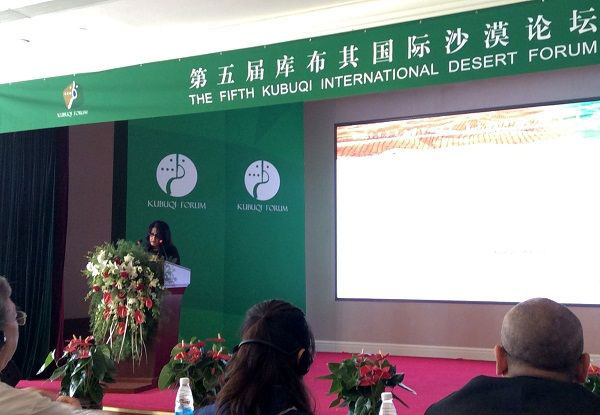Update on green economy program in China's Kubuqi Desert
Updated: 2015-07-29 16:10
By Guo Rong(chinadaily.com.cn)
|
|||||||||||
 |
|
Gemma Shepherd, program officer of UNEP, Division of Early Warning and Assessment, addresses the group [Photo/Guo Rong]. |
A desert green economy report reviewing the Kubuqi Ecological Restoration Project was launched on Tuesday at Seven Star Lake Hotel, Kubiqi Desert, in North China's Inner Mongolia autonomous region.
The review report is the result of coordination work by many authors and reviewers from institutions at home and abroad, with the support and supervision of the United Nations Environment Programme. It was funded by the Elion Foundation.
The objective of this review was to provide a scientific assessment of the Kubuqi Pilot Site with respect to the project's ecological economic and social sustainability, with a focus on private-public-community partnerships, said Zhang Shigang, the country coordinator of UNEP China Office.
Elion Resources Group (Elion) has taken up the challenge of greening 6,000 square kilometers of the Kubuqi Desert during the past 27 years. It's developed into an example of desert green economy.
Numerous government policies and schemes have been established for desert restoration, said Gemma Shepherd, the program officer of UNEP, Division of Early Warning and Assessment, when introducing the report.
"Elion provided not only financing but also developed technical innovation linkages, and contributed to policy development", Shepherd said. "Over 100,000 farmers and herdsmen have been among the largest beneficiaries of the Kubuqi project's green economy."
There are also two principles for the development of a desert green economy. The first is to adopt local resources and knowledge to develop the whole industry of desert plants, and the second is to make sure the water resource supply is sustainable, she added.
Elion could be an important supplement for international organizations such as UNEP, and Elion can unite companies with the same value to raise the development standard of the global environment and serve as an example, said Professor Liu Jinlong, co-author of Review of the Kubuqi Ecological Restoration Project.
The water table and population density should be taken into consideration on whether the Kubuqi model could be popularized in China's "Belt and Road" Initiative, said Huang Yi, coordinating lead author of GEO-5, a member of the High Level Intergovernmental Advisory Group for GEO-6 , and a professor of Peking University.
The project should be taken as a demonstration, and it is meaningful for the whole region on sustainable development and desertification control to summarize the results, said Shafqat Kakakhel, UNEP ex-deputy executive director and ex-assistant UN secretary-general.
Green economy was endorsed as the pathway towards sustainable development and poverty alleviation at Rio+20 UN Conference on Sustainable Development. However, the desert, as a unique ecosystem, supports significant plant and animal biodiversity, and is the home of some 144 million people around the world.
"We hope the Kubuqi model will create more natural and ecological values, and its creative model could be popularized in other regions and bring sustainable power for the development of Elion", said Yin Chengguo, executive director and CEO of Elion Resource Group.
The report was launched during the fifth Kubuqi International Desert Forum. It's theme was desert ecological civilization and co-building "Silk Roads'.
The forum is the only international forum dedicated to the development of the world's desert ecological civilization and was the first international desert forum in China.
Today's Top News
Libyan court gives death sentence to Gaddafi's son
Panda 'fakes pregnancy' to get better living conditions
Platini to announce FIFA bid
Chinese property giant sparks debate over Madrid project
Britain, France see euro reform as possible 'win-win'
Snow not a hurdle for Winter Olympics, says Beijing
Sino-Scottish deals worth £43m announced
Greek PM under pressure over drachma plan
Hot Topics
Lunar probe , China growth forecasts, Emission rules get tougher, China seen through 'colored lens', International board,
Editor's Picks

|

|
|

|

|

|






